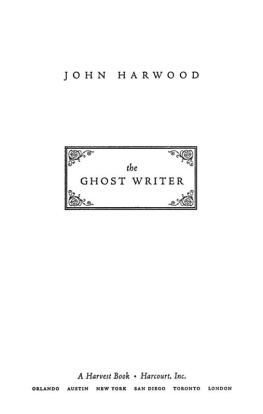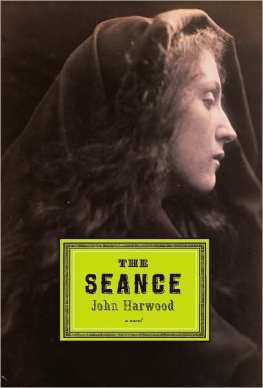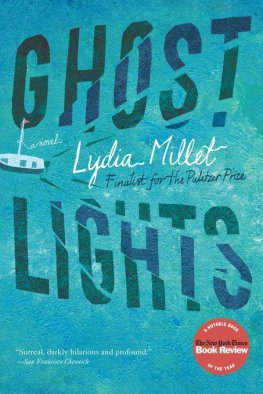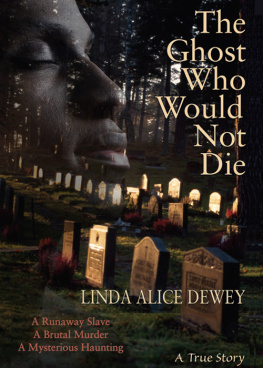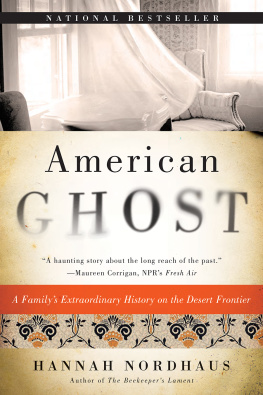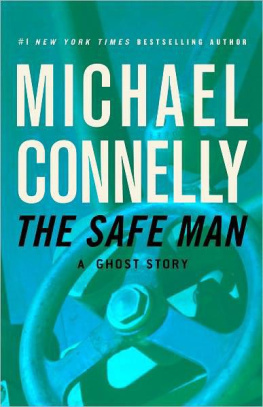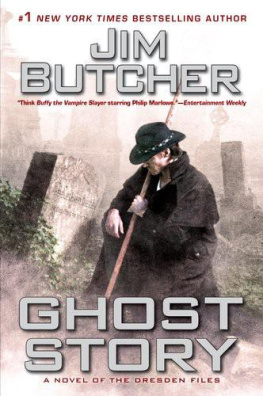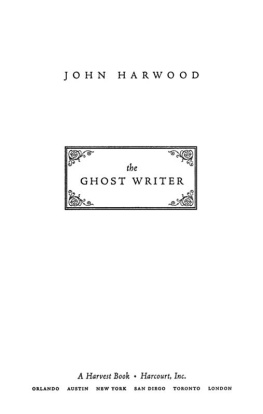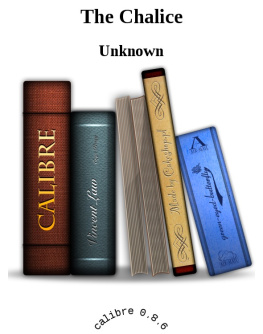Harwood - The Ghost Writer
Here you can read online Harwood - The Ghost Writer full text of the book (entire story) in english for free. Download pdf and epub, get meaning, cover and reviews about this ebook. City: Orlando, year: 2011;2005, publisher: Houghton Mifflin Harcourt, genre: Non-fiction. Description of the work, (preface) as well as reviews are available. Best literature library LitArk.com created for fans of good reading and offers a wide selection of genres:
Romance novel
Science fiction
Adventure
Detective
Science
History
Home and family
Prose
Art
Politics
Computer
Non-fiction
Religion
Business
Children
Humor
Choose a favorite category and find really read worthwhile books. Enjoy immersion in the world of imagination, feel the emotions of the characters or learn something new for yourself, make an fascinating discovery.
- Book:The Ghost Writer
- Author:
- Publisher:Houghton Mifflin Harcourt
- Genre:
- Year:2011;2005
- City:Orlando
- Rating:5 / 5
- Favourites:Add to favourites
- Your mark:
- 100
- 1
- 2
- 3
- 4
- 5
The Ghost Writer: summary, description and annotation
We offer to read an annotation, description, summary or preface (depends on what the author of the book "The Ghost Writer" wrote himself). If you haven't found the necessary information about the book — write in the comments, we will try to find it.
The Ghost Writer — read online for free the complete book (whole text) full work
Below is the text of the book, divided by pages. System saving the place of the last page read, allows you to conveniently read the book "The Ghost Writer" online for free, without having to search again every time where you left off. Put a bookmark, and you can go to the page where you finished reading at any time.
Font size:
Interval:
Bookmark:
A Harvest BookHarcourt, Inc.
ORLANDO AUSTIN NEW YORK SAN DIEGO TORONTO LONDON
Copyright John Harwood 2004
All rights reserved. No part of this publication may be reproduced or transmitted
in any form or by any means, electronic or mechanical, including photocopy,
recording, or any information storage and retrieval system, without permission
in writing from the publisher.
Requests for permission to make copies of any part of the work should be
mailed to the following address: Permissions Department, Harcourt, Inc.,
6277 Sea Harbor Drive, Orlando, Florida 32887-6777.
www.HarcourtBooks.com
First published in England by Jonathan Cape
Library of Congress Cataloging-in-Publication Data
Harwood, John.
The ghost writer/John Harwood.
p. cm.
1. Mothers and sonsFiction. 2. MothersDeathFiction.
3. FictionAuthorshipFiction. I. Title.
PR9619.4.H37G47 2004
813'.92dc22 2003024918
ISBN 0-15-101074-9
ISBN-13: 978-0156-0323-2 (pbk.) ISBN-10: 0-15-603232-5 (pbk.)
Text set in Fairfield Light with Adobe Jensen
Designed by Cathy Riggs
Printed in the United States of America
First Harvest edition 2005
E G I K J H F
for Robin and Deirdre
I FIRST SAW THE PHOTOGRAPH ON A HOT J ANUARY AFTER noon in my mothers bedroom. She was asleepso I thoughtin the sunroom at the other end of the house. I crept in through the half-open door, enjoying the feeling of trespass, breathing the scents of perfume and powder and lipstick and other adult smells, mothballs for the silverfish and insect spray for the mosquitoes our screens never quite managed to keep out. The net curtains were drawn, the blind half lowered; there was nothing to see through the window except the blank brick wall of old Mrs Noonan's place next door.
I stole across to my mothers dressing-table and stood listening in the dim light. The house was silent apart from the muffled ticking and creaking which my father insisted was the iron roof expanding in the heat, not someone creeping about in the dark cavity above the ceiling. One by one I tried the drawers, three on each side. As always, only the bottom left-hand drawer was locked. There were wooden panels between each layer, so you couldn't see what was in the drawer below by pulling out the one above. Last time I had searched through the litter of tubes and jars and bottles crammed into the uppermost drawer on the right. Today I started on the next one down, rummaging through a shoebox crammed with packets of needles and carded buttons, reels of coloured cotton and hanks of wool, the loose ends hopelessly tangled.
To see if there was anything behind the shoebox, I tugged at the drawer. It stuck, then shot right out of the dressing-table and hit the floor with a thud. I tried to force the drawer back in, but it wouldn't go. Any second now, I expected to hear my mother's footsteps hurrying up the hall, but no sound followed. Even the ticking in the ceiling had died away.
There seemed no reason why it wouldn't fit. Except that something cold and hard was stuck to the underside, right at the back. A small brass key. I had prised it loose, peeled away the tape and opened the locked drawer before the enormity of what I was doing had begun to register.
The first thing I saw was a book, whose title would elude me for years afterward. The Carillon? The Chemillon? The Chalmion? A word I didn't know. The grey paper cover was crumbling at the edges and pitted with rust-coloured spots. It had no pictures and looked grown-up and boring.
I couldn't find anything else. Then I saw that the brown paper lining on the bottom of the drawer was actually a very large envelope. It had a typewritten address and stamps on it, and one end had been slit with a knife. Another disappointment: just a thick bundle of pages with typewriting on them, tied together with rusty black ribbon. As I drew out the bundle, a photograph slid into my lap.
I had never seen the woman in the photograph before, and yet I felt I knew her. She was young, and beautiful, and unlike most people I had seen in photographs she did not look straight at you, but gazed away to one side, her chin tilted slightly upwards, as if she did not realise anyone was looking at her. And she did not smile, at least not at first. As I went on staring at her I began to think I could see the faintest trace of a smile, just at the corner of her mouth. Her neck was amazingly long and slender, and though the picture was in black and white, I felt I could see the changing colours of her skin where the light fell across the back of her neck and touched her forehead. Her hair, masses and masses of it, was drawn back behind her head and wound up in a long plait, and her gownas I felt sure a dress as wonderful as hers must be calledwas made of a soft dark velvety material, with shoulders gathered like the wings of angels.
Boys, I had learned from somewhere, were supposed to think their mothers were beautiful, but I suspected mine was not. She looked older and thinner than most of the mothers at my school, and worried about everything, especially me. Lately she had been very worried indeed. There were dark pouches under her eyes; the lines across her forehead and around her mouth seemed to be cutting deeper into the skin, and her hair, which used to be dark brown, had grey streaks running through it. I worried that I had worn her out by not being good enough; I was always meaning to be better, yet here I was burgling her secret drawer. But I also knew that the anxious, haunted look could descend when I had done absolutely nothing wrong. Whereas the woman in the photograph was calm and beautiful and alive, more alive than anyone I had ever seen in a picture.
I was still kneeling in front of the drawer, lost in the photograph, when I heard a hissing sound from the doorway. My mother stood rigid, fists clenched, nostrils flared. Tufts of hair stuck out from her head; the whites of her eyes seemed to be spilling out of their sockets. For a long, petrified instant she didn't move. Then she sprang, hitting and hitting and hitting me, screaming in time to the blows that fell wherever she could reach until I broke away and fled wailing down the hall.
F ROM OLD M RS N OONAN I LEARNED THAT IF YOU SHIVERED for no reason it meant that someone was walking over your grave. Mrs Noonan was thin and stooped and had twisted papery hands with strange bulges around the knuckles; she smelt of stale lavender and felt the cold even in summer, especially when she took her first sip of tea. My mother didn't like her saying it, so Mrs Noonan took to shivering silently when she was drinking tea in our kitchen, but I knew what she meant. When I wasn't being bad, I used to imagine that someone had found out my mothers grave, a man in dark clothes with a dead white face who dodged behind a tombstone whenever he saw you coming, so that you could never catch him doing it. That was why her anxious look came down for no reason at all. Some days you could tell that he was tramping back and forth, back and forth, over and over her grave.
We would sometimes drive past Mawson cemetery, but I'd never been inside because we had no relatives there to visit. My father's parents were buried in Sydney, and he had a married sister in New Zealand who wrote every Christmas, but they never came to see us. All my mother's relatives were buried in England, and that was where I imagined her grave must be.
Mawson is an overgrown country town sprawled along the edge of the Great Southern Ocean. It used to be called Leichhardt, after some luckless explorer who never returned from the dead heart, until, so my father explained, the council decided to change it to something more cheerful. Beyond the remnants of the old town centre there's nothing much to see except shopping malls and filling stations and mile after mile of sprawling identical suburbs. Beaches to the south, hills to the north; the dead heart beyond. That was where you ended up if you crossed the narrow strip of farmland beyond the hills and kept driving north through the endless sandy scrub and saltpan into the desert. In summer when the north wind blew, clouds of fine red dust covered the town. Even inside, you could feel the grittiness of it between your teeth.
Next pageFont size:
Interval:
Bookmark:
Similar books «The Ghost Writer»
Look at similar books to The Ghost Writer. We have selected literature similar in name and meaning in the hope of providing readers with more options to find new, interesting, not yet read works.
Discussion, reviews of the book The Ghost Writer and just readers' own opinions. Leave your comments, write what you think about the work, its meaning or the main characters. Specify what exactly you liked and what you didn't like, and why you think so.

